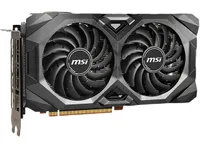Get a Radeon RX 5600 XT for $100 Less Than an RTX 2060
Newegg’s latest deal gives you more performance than an RTX 2060 for a lot less money.
The Nvidia Geforce RTX 3000 series is right around the corner, and while we’ve already written about how its lower-than-expected pricing is impacting older Nvidia GPUs, AMD cards don’t seem to be immune to price drops either. Take the MSI Radeon RX 5600 XT, which offers similar performance to the Nvidia Geforce RTX 2060 and is now only $220 on Newegg (with promo code EMCDRGK36 and after a $20 rebate).
The Radeon RX 5600 XT came out earlier this year for a starting price of $280. At 36 CUs and with 6GB of GDDR6 memory, it’s meant to support high-end FHD and entry-level 1440p gaming. The particular model that Newegg has on sale comes from MSI, has a max boost frequency of 1.62 GHz and connects over PCIe 4.0. It also has two fans, one HDMI 2.0 port and three DisplayPort 1.4 connections.
MSI Radeon RX 5600 XT: was $289.99 now $219.99 @ Newegg
The MSI Radeon RX 5600 XT is an AMD GPU that’s competitive with the RTX 2060 thanks to its 36 CUs, 1.62 GHz max boost clock and 6GB of GDDR6 memory. It’s also now over $100 cheaper than the RTX 2060 after a promo code and rebate.
Our review for the RX 5600 XT praised the card for beating the RTX 2060 in most titles while drawing less power and being closer to the GTX 1660 Ti in price. For example, it earned an average 91.4 fps in The Division 2 on our test system compared to 83.6 fps from the RTX 2060. Given that the RTX 2060 currently sells for closer to $330, being able to beat it on performance for over $100 less is an attractive deal.
Plus, Newegg’s sale comes with free copies of Godfall and World of Warcraft: Shadowlands. If you are interested in these games, that makes this card an even sweeter deal if you aren't willing to wait to see what comes from Nvidia and AMD in terms of mainstream cards in the coming months.
Get Tom's Hardware's best news and in-depth reviews, straight to your inbox.
Michelle Ehrhardt is an editor at Tom's Hardware. She's been following tech since her family got a Gateway running Windows 95, and is now on her third custom-built system. Her work has been published in publications like Paste, The Atlantic, and Kill Screen, just to name a few. She also holds a master's degree in game design from NYU.
-
King_V Dang it, NewEgg/MSI, where was this deal back in March??!?Reply
I am still tempted, but I think my XPS 8700 probably won't play nicely with current generation cards. -
hotaru.hino Reply
I would say get it anyway and see if you can make it work before the return period is up. But it's from NewEgg.King_V said:Dang it, NewEgg/MSI, where was this deal back in March??!?
I am still tempted, but I think my XPS 8700 probably won't play nicely with current generation cards. -
Chung Leong I wouldn't recommend buying a RX 5000 series graphics card at this point. Even if you don't care at all about ray-tracing, it's still a poor deal as the older card might be missing other next-gen techs like DirectStorage.Reply -
King_V Reply
Nah - I'm not even gaming that much, and, when I do, the GTX 1080 is handling it well.hotaru.hino said:I would say get it anyway and see if you can make it work before the return period is up. But it's from NewEgg.
I'm really trying to hold off on getting a new system until the successor to AM4 comes out. -
King_V Reply
Well, I'm not buying anything, but for anyone even looking at an RTX 2060 Super, RTX 2060, or even a GTX 1660/1660 Super/1660 Ti, I would say they're foolish NOT to get this deal instead.Chung Leong said:I wouldn't recommend buying a RX 5000 series graphics card at this point. Even if you don't care at all about ray-tracing, it's still a poor deal as the older card might be missing other next-gen techs like DirectStorage.
It's about price/performance, not about whether or not a technology that nobody is using yet is implemented. -
spentshells ReplyKing_V said:Nah - I'm not even gaming that much, and, when I do, the GTX 1080 is handling it well.
I'm really trying to hold off on getting a new system until the successor to AM4 comes out.
5600xt and the 1080 performance is about par anyway. -
Chung Leong ReplyKing_V said:It's about price/performance, not about whether or not a technology that nobody is using yet is implemented.
Old Navi is also missing variable-rate shading. That's good for 20% to 30% boost in FPS. The 1650/1660 Super are better value if you must buy now. -
King_V Reply
No, they are not.Chung Leong said:Old Navi is also missing variable-rate shading. That's good for 20% to 30% boost in FPS. The 1650/1660 Super are better value if you must buy now.
Variable rate shading's performance enhancements, if any, aren't part of the equation. The cards we're talking about already have had their performance measured - these are known quantities.
The 1650 is in a different performance class entirely, and a much lower tier of performance at that. There was ONE good deal on a 1650 recently, and I snapped one up for one of my systems, but that deal is gone now.
The 1660 Super cannot match the 5600 XT's performance, as, overall, the 5600 XT is approximately 20% faster than the 1660 Super. Or, if you prefer the math in the other direction, the 1660 Super is approximately 25% slower.
The 5600XT is slightly ahead of the 2060, and the 2060 is well ahead of the 1660 Super.
Yet, the cheapest 1660 Super today is about the same price as this deal on the 5600 XT. Most 1660 Super models cost more. How does paying equal or more money for a card that has less performance turn out to be a better value?
EDIT: The equation is very simple:
For a given approximate price bracket - if one card performs X% faster than the other, and costs Y% more money, where 0 ≤ Y < X, then the first card is the better value. -
Chung Leong ReplyKing_V said:EDIT: The equation is very simple:
For a given approximate price bracket - if one card performs X% faster than the other, and costs Y% more money, where 0 ≤ Y < X, then the first card is the better value.
That's a silly way of measuring value. If all you have is a 60hz monitor, then what value do you get from a card that can deliver 100FPS? The proper question to ask is for how long can you use these cards before they're obsolete. The Turing cards will hold up better because they support VRS. Nvidia has also stated that Turing will get DirectStorage support (whether there's decompression hardware in the older chip in a big question, however).
The best thing to do now is to wait. It's quite likely that AMD will release in the coming months a budget Big Navi card at that price range. -
King_V Yes, that IS a silly way of measuring it - if we were talking about radically different performing cards, which YOU were doing, by bringing in the GTX 1650.Reply
But you seem to be fighting tooth and nail against this deal, and it seems to be because it is the RX 5600 XT.
You explicitly stated that the 1660 Super, which causes equal to or more than this RX 5600 XT deal, but performs less, is somehow better. Why would you insist on such an assertion?
Why are you so dead set against admitting that this deal is good?

